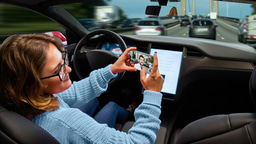Learning Technology: Three Predictions for 2022 and Beyond

Experts have predicted the rise of the digital campus for nearly a decade, and while many colleges and universities have fully embraced a robust AV environment, the recent pandemic demonstrated that all educational institutions must be able to adapt its programs, platforms, and processes nearly in real time. Software and digital platforms that promote diverse learning modalities, engage students, and ensure accessibility and equity are among the investments administrators are pursuing. It is important for students to feel connected to their courses and campuses regardless of how they attend classes.
Hybrid and online learning models dominated during the pandemic, and they will continue to thrive as we manage COVID and emerge from lockdowns. Educators can fill the gap with Ed-tech tools that provide engaging online experiences that make curricula more relevant and can also help students feel more connected.
University Business' Matt Willmore recently spoke with experts at universities and colleges about the needs and expectations of their students and has some insights to share about student engagement moving forward.
1. Centralized Access to Information
"Students expect to have instant access to information, so schools strive to provide constant communication regarding campus directions, counseling services, dining menus, registration, class and shuttle schedules, and more," says Willmore. "However, this information may live in many different places, which can make it difficult to access."
He predicts that institutions will continue to move towards integration of this information, so learners can look up answers to questions without having to navigate multiple systems.
2. The Next Level of Personalization
According to Steve Sedlock, digital marketing and communications manager at the University of Akron, "the trend will continue to be personalization, but in 2022 it will be improved." Students will have access to dashboards that integrate campus data systems to provide them with information relevant to their schedules, and preferences.
3. Artificial Intelligence and Augmented Reality
Bryan Seilhamer, assistant director of mobile strategy and innovation at the University of Central Florida, anticipates that these technologies, which are already available to us through smartphones, will be used more intentionally in the years to come: “I think the unrealized potential is simply taking advantage of the immense technology in a modern smartphone which includes enhancing the location-based experience, adding better integration with digital ID cards, and exploring augmented reality.”
Sedlock agrees: “As new technologies like augmented reality and artificial intelligence enter the app space, we’ll see even more dynamic engagement opportunities for students.”
For example, human-assisted artificial intelligence for grading and teaching assistant programs have become more automated, improving accuracy and consistency and saving time. As a result, educators using AI can lessen redundant responsibilities and facilitate their focus back to their students.






Please sign in or register for FREE
If you are a registered user on AVIXA Xchange, please sign in
@Joey Davis I totally agree with #3! In my grad school, they are experimenting with augmented reality and how it can be used in the classroom. Supposedly my next term will have some VR and AR tech available to demo in my classes. Since some of my classmates are virtual, it will be interesting to see how much it enhances learning experiences for all.
Cybersecurity in higher education is going to become even more important.
I'm all here for AR and AI technology! As long as the robots don't rebel!
Seilhamer’s comment is interesting insight. I've seen AI and AR often used at museums or parks. The Orlando Science Center uses AR and a location-based experience through your smartphone! When you're near an exhibit, the documents/games/experiences that go along with it appear on the app.